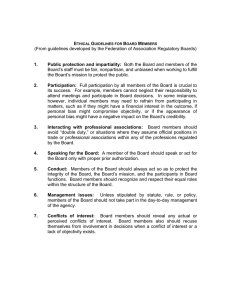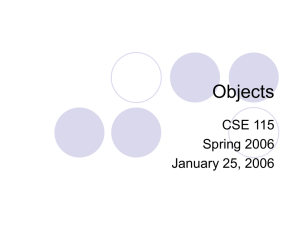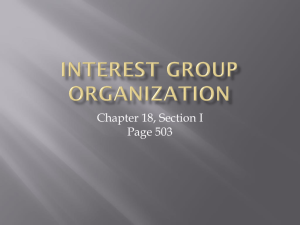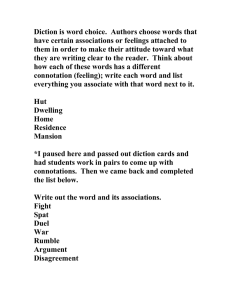Objective Reporting: Where Can It Be Found? C. Eugene Steuerle
advertisement
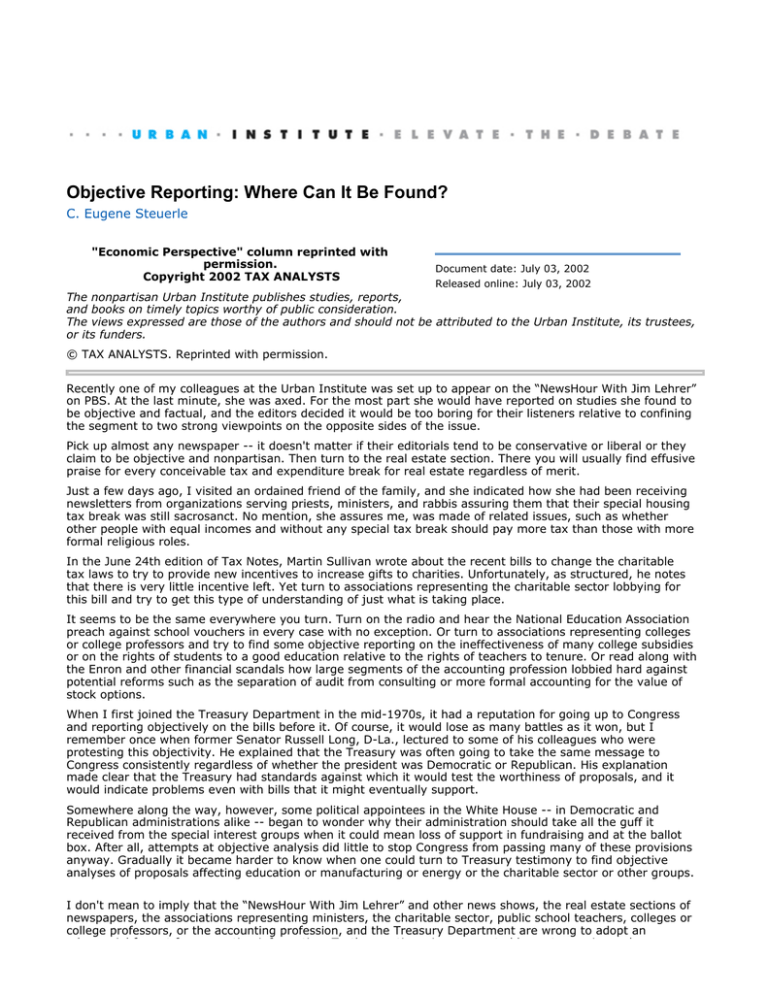
Objective Reporting: Where Can It Be Found? C. Eugene Steuerle "Economic Perspective" column reprinted with permission. Copyright 2002 TAX ANALYSTS Document date: July 03, 2002 Released online: July 03, 2002 The nonpartisan Urban Institute publishes studies, reports, and books on timely topics worthy of public consideration. The views expressed are those of the authors and should not be attributed to the Urban Institute, its trustees, or its funders. © TAX ANALYSTS. Reprinted with permission. Recently one of my colleagues at the Urban Institute was set up to appear on the “NewsHour With Jim Lehrer” on PBS. At the last minute, she was axed. For the most part she would have reported on studies she found to be objective and factual, and the editors decided it would be too boring for their listeners relative to confining the segment to two strong viewpoints on the opposite sides of the issue. Pick up almost any newspaper -- it doesn't matter if their editorials tend to be conservative or liberal or they claim to be objective and nonpartisan. Then turn to the real estate section. There you will usually find effusive praise for every conceivable tax and expenditure break for real estate regardless of merit. Just a few days ago, I visited an ordained friend of the family, and she indicated how she had been receiving newsletters from organizations serving priests, ministers, and rabbis assuring them that their special housing tax break was still sacrosanct. No mention, she assures me, was made of related issues, such as whether other people with equal incomes and without any special tax break should pay more tax than those with more formal religious roles. In the June 24th edition of Tax Notes, Martin Sullivan wrote about the recent bills to change the charitable tax laws to try to provide new incentives to increase gifts to charities. Unfortunately, as structured, he notes that there is very little incentive left. Yet turn to associations representing the charitable sector lobbying for this bill and try to get this type of understanding of just what is taking place. It seems to be the same everywhere you turn. Turn on the radio and hear the National Education Association preach against school vouchers in every case with no exception. Or turn to associations representing colleges or college professors and try to find some objective reporting on the ineffectiveness of many college subsidies or on the rights of students to a good education relative to the rights of teachers to tenure. Or read along with the Enron and other financial scandals how large segments of the accounting profession lobbied hard against potential reforms such as the separation of audit from consulting or more formal accounting for the value of stock options. When I first joined the Treasury Department in the mid-1970s, it had a reputation for going up to Congress and reporting objectively on the bills before it. Of course, it would lose as many battles as it won, but I remember once when former Senator Russell Long, D-La., lectured to some of his colleagues who were protesting this objectivity. He explained that the Treasury was often going to take the same message to Congress consistently regardless of whether the president was Democratic or Republican. His explanation made clear that the Treasury had standards against which it would test the worthiness of proposals, and it would indicate problems even with bills that it might eventually support. Somewhere along the way, however, some political appointees in the White House -- in Democratic and Republican administrations alike -- began to wonder why their administration should take all the guff it received from the special interest groups when it could mean loss of support in fundraising and at the ballot box. After all, attempts at objective analysis did little to stop Congress from passing many of these provisions anyway. Gradually it became harder to know when one could turn to Treasury testimony to find objective analyses of proposals affecting education or manufacturing or energy or the charitable sector or other groups. I don't mean to imply that the “NewsHour With Jim Lehrer” and other news shows, the real estate sections of newspapers, the associations representing ministers, the charitable sector, public school teachers, colleges or college professors, or the accounting profession, and the Treasury Department are wrong to adopt an adversarial format for presenting information. Truth sometimes is represented by a strong view only on one adversarial format for presenting information. Truth sometimes is represented by a strong view only on one side of an issue, and in many cases truth can be found by balancing two strong and opposing views. And fairly objective information can be found -- if you go looking for it. Still . . . still . . . I find myself very uncomfortable with the current balance. In a society with information overload, I want to be able to find good information quickly and easily, to be able to depend on reliable information sources. If someone wants to have his prejudices stroked, then fine, let him pick up grocery store tabloids. But when I listen to the national news (especially on public television) or read the newspaper (in many cities, there is often only one major choice), I don't want to have fairly objective sources denied me because they aren't as exciting and prone to battle as warriors on the extreme side of each issue. When I turn to government institutions supported by my tax dollar, I want them to pass on what they've learned with my tax dollar. And in each case I want enough facts to allow me to come to my own conclusions. When I pick up information from associations, especially those claiming to serve me, I don't want to see only special interest pleading. I am especially appalled when groups somehow claiming to serve the broader public as part of their mission -- for instance, those representing education or charity or churches -- seem to lapse largely into the lowest form of special interest pleading. Ditto for those professional associations -accountants, lawyers, economists, doctors -- when they seem only to proclaim that the public interest is served when more money and power comes their way. And I'm tired of not being able to join associations for veterans or environmentalists or other concerned groups because they are devoted narrowly to special interest pleading or demogoguery and refuse to try to make balanced presentations. Although all of us approach issues with certain amounts of bias (often that we don't even understand), there are standards on how to report objectively -- such as inclusion of relevant facts, no matter how they turn the argument; the recognition of legitimate pros, cons, costs, and benefits of proposals and provisions; and the use of appropriate research methodology and rules for reporting on the significance of statistics. This does not mean that good and bad arguments should be given equal weight, but an argument is not bad simply because it supports a position other than our own. If the problem is systemic, then the solutions need to go beyond mere individual claims of indignation. Some reforms can come from within existing institutions, but they need to involve recognized subgroups and committees that are formally charged with setting standards or moving associations beyond their natural tendency to plead the special interests of their members. Failing those efforts, reform is probably not possible without more competition and encouragement of alternative institutions to represent, say, accountants, teachers, or doctors. As long as I am taking on revered institutions -- in fact, my complaints here are addressed at institutions for which I have a fair degree of respect -- let me add foundations to the list. In a world where adversary groups more and more try to dominate the information flow, foundations could fill a vital middle ground by funding groups that attempt to report objectively, associations aimed at improving professional standards rather than simple special interest pleading, and watchdog groups that could rate accuracy in reporting. Unfortunately, many foundations have decided that their role is mainly to add to the funding of groups who put naïve liberal or conservative labels on their output or whose output tends to support causes that they, the foundation officers, favor. Again, there is nothing wrong with these efforts: the causes and special interests often are worthy. It is simply that the foundations frequently are doing what everyone else is doing rather than recognizing their unique opportunity and ability to fill a vital information gap. There is no one way to get better and more objective information on public issues. All of us at different times can gain materially by selective perception and presentation of information. The lesson is not that nothing can be done, but just the opposite. Concerned citizens must be constantly vigilant, demand that both private and public institutions purporting to serve the public do just that, and put up some money to back up their words. Other Publications by the Authors C. Eugene Steuerle Usage and reprints: Most publications may be downloaded free of charge from the web site and may be used and copies made for research, academic, policy or other non-commercial purposes. Proper attribution is required. Posting UI research papers on other websites is permitted subject to prior approval from the Urban Institute—contact publicaffairs@urban.org. If you are unable to access or print the PDF document please contact us or call the Publications Office at (202) 261-5687. Disclaimer: The nonpartisan Urban Institute publishes studies, reports, and books on timely topics worthy of public consideration. The views expressed are those of the authors and should not be attributed to the Urban Institute, its trustees, or its funders. Copyright of the written materials contained within the Urban Institute website is owned or controlled by the Urban Institute. Source: The Urban Institute, © 2012 | http://www.urban.org
